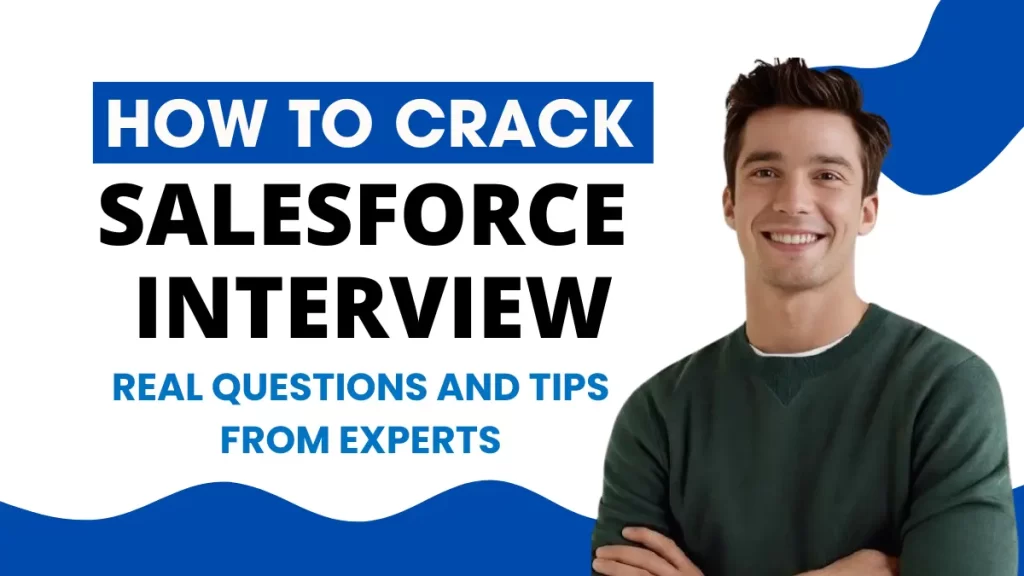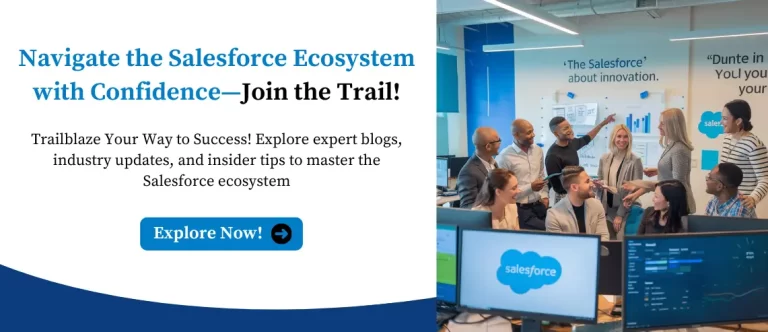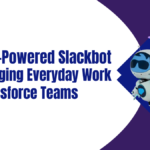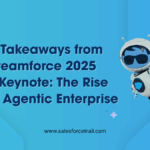Preparing for a Salesforce interview can feel a bit scary especially if it’s your first time. You might wonder what questions they’ll ask, how much you need to know, or if you’re even ready. The good news? You don’t need to know everything you just need the right plan, real practice, and some smart tips.
In this blog, I’ll guide you through everything you need to crack the Salesforce interview from real questions to expert advice. Whether you’re starting, changing careers, or already working in Salesforce, this guide will help you feel confident and prepared.
You’ll learn:
- What to expect during the interview process
- The most common questions and how to answer them
- Simple but powerful tips that top candidates use
- What mistakes to avoid and how to stand out
Let’s make your Salesforce interview prep simple, clear, and effective so you can walk in with confidence and success.
Understanding the Salesforce Interview Landscape
Salesforce roles are diverse. You could be a Developer, an Administrator, a Business Analyst, or something else entirely. This means the interview questions will vary depending on the specific role you’re applying for. However, there are some core areas that almost every Salesforce interview will touch upon.
Key Areas to Focus On:
- Salesforce Fundamentals: This is the foundation. Expect questions about core Salesforce concepts like the Sales Cloud, Service Cloud, CRM basics, and the overall architecture of the platform.
- Configuration & Customization: How well do you understand setting up and tweaking Salesforce without writing code? This includes things like creating users, roles, profiles, workflows, validation rules, and reports and dashboards.
- Development (if applicable): If you’re interviewing for a developer role, prepare for questions about Apex (the programming language used in Salesforce), Lightning Web Components (LWC), Visualforce, SOQL (Salesforce Object Query Language), and integrations.
- Problem-solving: Salesforce professionals are problem-solvers. Expect scenario-based questions that will require you to think on your feet and explain how you’d approach a specific business challenge using Salesforce.
- Communication & Business Acumen: Can you explain technical stuff in a way that non-technical people understand? Do you grasp how Salesforce helps businesses achieve their goals? These are crucial aspects.
Real Salesforce Interview Questions (and how to approach them):
Let’s look at some actual questions you might encounter, categorized by the key areas:
Salesforce Fundamentals:
- Question: Can you explain the difference between a Profile and a Permission Set in Salesforce?
- How to Answer: Explain that Profiles define what a user can do in Salesforce (object access, field-level security, app settings), while Permission Sets extend those permissions. Think of Profiles as the foundation and Permission Sets as add-ons.
- Question: What are the different types of relationships between objects in Salesforce?
- How to Answer: Discuss Lookup and Master-Detail relationships, highlighting the key differences like ownership, required fields, and deletion behavior.
Configuration & Customization:
- Question: Walk me through the steps to create a new workflow rule in Salesforce.
- How to Answer: Clearly outline the process: Object selection, defining evaluation criteria, setting up rule criteria, and adding workflow actions (like- email alerts, task creation, or field updates).
- Question: What steps would you take to ensure that users must complete a specific field before saving a record?
- How to Answer: Explain the use of validation rules and how to define the criteria and error message.
Development (if applicable):
- Question: Explain the concept of Governor Limits in Apex.
- How to Answer: Discuss that Governor Limits are in place to ensure fair resource usage in the multi-tenant Salesforce environment. Mention examples like SOQL query limits, CPU time limits, and heap size limits.
- Question: “What are Lightning Web Components (LWCs), and why are they important?”
- How to Answer: Explain that LWCs are a modern, standards-based framework for building user interfaces on Salesforce. Highlight their performance benefits and alignment with web standards.
Problem-Solving:
- Question: A sales team complains that they are missing important follow-up tasks. How would you address this using Salesforce?
- How to Answer: Think through the process: Understand the current process, identify the gaps, and suggest solutions such as creating workflow rules or process builder flows to generate follow-up tasks based on specific criteria.
- Question: How would you handle a situation where two different departments need to see different sets of fields on the same Account object?
- How to Answer: Discuss using Page Layouts assigned to different profiles or record types to control field visibility.
Communication & Business Acumen:
- Question: “Explain Salesforce to someone who has never heard of it.”
- How to Answer: Keep it simple! Explain that Salesforce is a tool that helps businesses manage their customer relationships and streamline their sales, marketing, and customer service processes – all in one place.
- Question: “How do you stay updated with the latest Salesforce features and releases?”
- How to Answer: Mention following the official Salesforce release notes, Trailhead, Salesforce blogs, and community forums.
Salesforce Interview Questions for Developer (Apex & LWC), Salesforce Business Analyst (BA), SFMC Consultant, Salesforce Integration & Mulesoft Developer
Salesforce Developer (Apex & LWC)
Beginner:
- What is a Trigger in Salesforce?
- What is the difference between SOQL and SOSL?
- What are Governor Limits in Salesforce?
- What is the use of @AuraEnabled in Apex?
- How do you call an Apex method from LWC?
Intermediate:
- Explain the order of execution in Salesforce.
- Write an Apex Batch Class to update inactive Contacts.
- Difference between Future Method and Queueable Apex.
- What is the difference between @wire and imperative method in LWC?
- How do you handle bulk DML operations efficiently?
Salesforce Business Analyst (BA)
Beginner:
- What is the difference between Sales Cloud and Service Cloud?
- How do you gather business requirements for a Salesforce project?
- What is Agile methodology, and how is it used in Salesforce projects?
- What are User Stories, and how do you write them?
- What is the difference between Workflow, Process Builder, and Flow?
Intermediate:
- How do you conduct a GAP analysis for Salesforce implementation?
- What are the key considerations for designing a Salesforce Security Model?
- Explain the process of lead-to-opportunity conversion.
- How do you prioritize requirements in a Salesforce project?
- What are some common challenges when implementing Salesforce?
Salesforce Marketing Cloud Consultant
Beginner:
- What is the difference between All Subscribers and All Contacts?
- Explain the concept of Journey Builder in SFMC.
- What is a Data Extension, and how does it differ from a List?
- How do you track email performance in SFMC?
- What are Publication Lists used for?
Intermediate:
- How do you write an SQL query to get all contacts who opened an email in the last 30 days?
- What is the difference between Transactional and Commercial Emails?
- How do you encrypt and decrypt files in Automation Studio?
- What are the different ways to start automation in SFMC?
- How do you integrate SFMC with Salesforce CRM?
Salesforce Integration & Mulesoft Developer
Beginner:
- What is the difference between REST API and SOAP API?
- What is an Integration User in Salesforce?
- What are Named Credentials in Salesforce?
- What are the different Authentication Mechanisms used in Salesforce API integration?
- Explain the difference between Inbound and Outbound Integration.
Intermediate:
- How do you use Platform Events for Integration?
- What is OAuth 2.0 in Salesforce Integration?
- Explain the Governor Limits that apply to API calls.
- What is the difference between Middleware (Mulesoft) and Direct API Integration?
- How do you handle API Rate Limits in Salesforce?
Expert Tips to Crack the Salesforce Interview
- Do Your Homework: Research the company and the specific role you’re applying for. Understand their industry and how Salesforce might be used in their context.
- Master the Basics: Even if you’re applying for an advanced role, a strong understanding of the fundamentals is crucial.
- Practice, Practice, Practice: Try to answer potential interview questions out loud. This will help you articulate your thoughts clearly and confidently.
- Use the STAR Method: For behavioral questions (like “Tell me about a time you faced a challenge…”), use the STAR method (Situation, Task, Action, Result) to structure your answers effectively.
- Be Enthusiastic and Show Your Passion: Interviewers want to see that you’re genuinely interested in Salesforce and the opportunity.
- Ask Thoughtful Questions: At the end of the interview, have a few well-prepared questions ready. This shows your engagement and interest.
You’ve Got This!
Preparing for a Salesforce interview takes effort, but by understanding the key areas, practicing with real questions, and following these expert tips, you’ll be well on your way to crack the Salesforce interview and landing your dream job. Remember to be confident, be yourself, and let your passion for Salesforce shine through. Good luck!
Must Visit Links:
- How Much You Can Earn as a Salesforce Consultant in 2025?
- Top Most In-Demand Salesforce Skills for 2025: What Professionals Need to Know
- The Importance of Hands-On Experience in Mastering Salesforce Skills
- How I Passed the Salesforce Data Architect Exam on My First Attempt
- How to Prepare for the Certified Agentforce Specialist Certification Exam
Resources
- [Salesforce Developer]- (https://developer.salesforce.com/)
- [Salesforce Success Community] (https://success.salesforce.com/)
For more insights, trends, and news related to Salesforce, stay tuned with Salesforce Trail

Vivek K.
Vivek is a skilled Salesforce Consultant and Developer who specializes in building efficient, scalable CRM solutions. At Salesforce Trail, he shares practical insights and tools to help professionals streamline processes and get the most out of their Salesforce journey.
- Vivek K.#molongui-disabled-link
- Vivek K.#molongui-disabled-linkNovember 3, 2025
- Vivek K.#molongui-disabled-link
- Vivek K.#molongui-disabled-link













1 Comment
Wow! This could be one particular of the most helpful blogs We have ever arrive across on this subject. Actually Fantastic. I’m also an expert in this topic therefore I can understand your hard work.